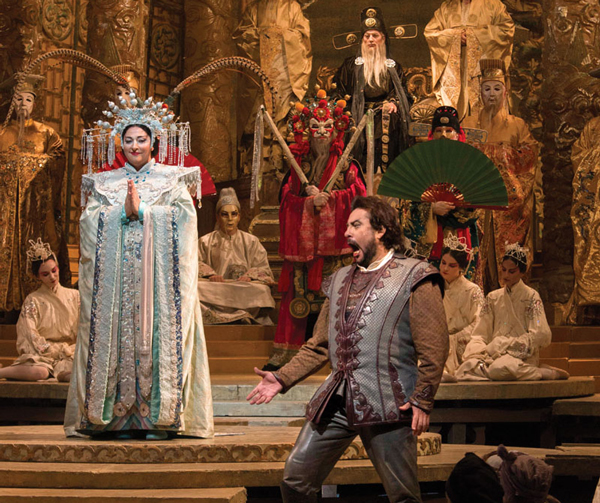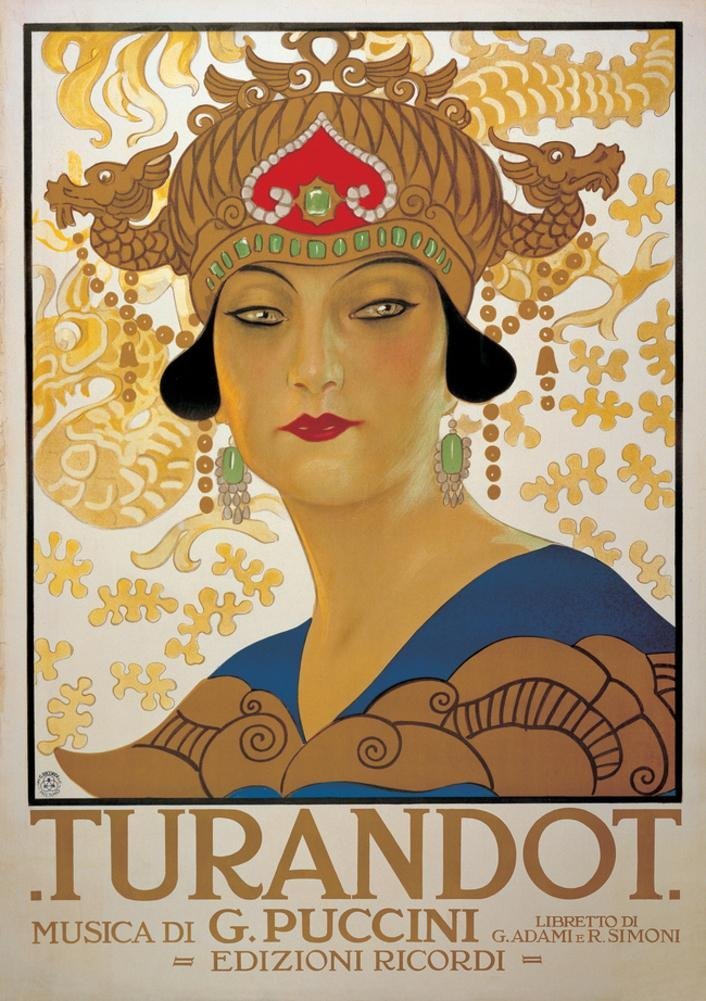|
Saturdee
Opry Links # 87: "Turandot" Handicap
 
Turandot (Christine Goerke), Emperor Altoum
(Mark Schowalter) and Calàf (Marcelo Álvarez) in Franco Zeffirelli’s Met staging
of Turandot
Saturdee Opry Links Overture
Puccini: Preludio Sinfonico
https://www.youtube.com/watch?v=Bvk0uucjnB4&list=RDBvk0uucjnB4&start_radio=1
It's another SOL handicap, this time for Puccini's "Turandot." (Correctly
pronounced "Turan DOH!", as it was in Puccini's day. Right, "Doh!" as in Homer
Simpson, who stole it from James Finlayson.) So. . .
“Turandot,” is a fairy tale. It is a very good idea to bear this in mind,
because the plot resolution is rather exasperating. The evil queen wins, and the
girl-with-the-heart-of-gold dies---all in the interests of what Hollywood
shitheads would term, "redemption." Puccini set about, in this, his last work,
to be extremely modern in theme and orchestration (as he had, to a lesser
extent, done with “La Fanciulla del West” some years earlier.”) The high points
of “classic Puccini,” which is to say, lyrical Puccini, were, obvious to say,
“Boheme” and “Butterfly.” In “Turandot,” you can hear intimations of Wagner and
Debussy, as well as themes and moments that are downright dissonant,
acknowledging the influence of Schoenberg, Berg, etc. Having the opera set in
mythical China also helped with the other-worldly quality of the music. As you
might know, three of the main themes in “Turandot” are Chinese, having been
lifted from a music box Puccini heard. (He also used Japanese---and
Chinese---melodies in “Butterfly.”) Here is an interesting article about that
music box, and how Puccini adapted Chinese and Japanese music in “Turandot” and
“Butterfly.” Also note in article, re: Butterfly, how Puccini deliberately made
use of an old Chinese “erotic song.” Exclamation point.
MUSIC BOX AS PUCCINI MUSE:
https://www.nytimes.com/2012/06/17/arts/music/puccini-opera-echoes-a-music-box-at-the-morris-museum.html
1.
Here are two of the big arias from Puccini's "Turandot:" the tender “Signore
Ascolta,” and noble “Non Piangere Liu” (with English captions), sung by Roberto
Alagna and (his wife) Aleksandra Kurzak.
https://www.youtube.com/watch?v=_EykQKHKP-M
“Signore Ascolta”
• Setting : The streets of Peking
• Synopsis : Liù, the slave girl, Calaf and his father, Timur, are in the midst
of a processional to the execution of the Prince of Persia who attempted to win
the Princess Turandot by answering three riddles. If he had given the correct
answers, he would have married the Princess, but the price for incorrectly
answering them was having to watch 50 episodes of “American Idol,” or die. (All
chose death.) During the processional, Calaf catches a glimpse of Turandot,
falls in love with her immediately, and decides to attempt to answer the three
riddles. Liù sings this aria to beg him not to risk his life for the Princess.
Poor Liu!
“Non Piangere Liu”
Synopsis : After Liù begs him tearfully not to risk his life by playing a deadly
game to win the Princess Turandot, Calaf responds to her gently, asking her not
to weep. He shows her an episode of “American Idol,” but she only weeps more.
(Okay, not really.)
AND, FOR FUN:
Here is Jussi Bjorling with "Non Piangere Liu."
https://www.youtube.com/watch?v=mVsPJ5iRI8g
And Maria Callas with "Signore Ascolta:"
https://www.youtube.com/watch?v=IvT4NVi39vw
2.
Here is the ice queen's big moment, “In Questa Reggia”:
Synopsis : Turandot warns Calaf of the danger of the deadly game of riddles he
proposes to take part in to win Turandot in marriage. She explains to him that
the game is to avenge her ancestress, who was killed when a warlord conquered
her country. Kind of a Hatfields and McCoys thing.
https://www.youtube.com/watch?v=1WO3ZyBIePo
Translation:
http://www.aria-database.com/translations/turandot04_in.txt
Here is Birgit Nilsson, who was legendary in the role:
https://www.youtube.com/watch?v=S-GV5t5XLjg
And with Giovanna Casolla, in the astounding production staged at the Forbidden
City:
https://www.youtube.com/watch?v=1WO3ZyBIePo
3.
Liu's final aria, "Tu Che di Gel Sei Cinta." ("You who are girded with ice.")
To Turandot's horror, Calaf does indeed answer all three riddles, and quite
cleverly. Turandot panics, pleading with her father to be let out of the
marriage bargain. Calaf crazily offers an alternative: if Turandot can guess his
name before morning, he will agree to be executed. Pure logic! The wonderful
Princess Turandot then tortures poor Liu to get her to cough up Calaf's name,
but. . .nothin’ doin’.” Liu would rather die than betray him. Turandot demands
to know how she resists the torture so well, and Liu replies that her love for
the "Unknown Prince" keeps her loyal to him. She goes on to sing that Turandot's
icy heart will one day be melted by Calaf and that Turandot will love him as Liù
does now. She commits suicide. Here is Liu’s aria, sung by wonderful Leona
Mitchell:
https://www.youtube.com/watch?v=o-Gsj70wPrg
Translation:
https://en.wikipedia.org/wiki/Tu_che_di_gel_sei_cinta
AND, just for fun, here is exquisite Monserrat Caballe:
https://www.youtube.com/watch?v=Ep-XIA1o1-o
4.
And of course. . .the great, great aria that has been butchered by everyone from
Michael Bolton to Aretha Franklin. . .
"Nessun Dorma" ("None shall sleep.")
Synopsis : A herald has just announced that no one will sleep in the Peking
until the Calaf's name is known to the Princess--- under pain of death. Calaf,
who knows that he has agreed to be killed if Turandot learns his name before the
morning, is not worried. He is sure that he will be the only one to reveal his
name to the Princess after morning has come, and that Her Icy Majesty will agree
to be his wife. No accounting for taste!
Here are three versions:
Luciano Pavarotti, in a staged version used in his movie, "Yes, Giorgio:"
https://www.youtube.com/watch?v=Q_hLh4qCqpg
Mario Lanza, on stage at the Hollywood Bowl, 1948:
https://www.youtube.com/watch?v=3R_X6DDo2Ik
And the astonishing, largely forgotten Giuseppe Giocomini
https://www.youtube.com/watch?v=e8meRRpPFnk
Translation:
https://en.wikipedia.org/wiki/Nessun_dorma
5.
So is it "TuranDOT" or "TuranDOH?" Answer: Puccini and his contemporaries said "Doh!"---like
Homer Simpson and the originator of the exclamation, James Finlayson. Here is
Finlayson:
https://www.youtube.com/watch?v=bu-RMcvSzPw
And here is a link to a discussion of the subject:
https://www.talkclassical.com/26660-how-do-you-pronounce.html
6.
Puccini died before he could finish “Turandot.” He completed all of acts one and
two, including orchestration, and act 3 up to the point of Liu’s death and
funeral. From Wikipedia: "He left behind 36 pages of sketches on 23 sheets for
the end of Turandot. Some sketches were in the form of 'piano-vocal' or 'short
score,' including vocal lines with 'two to four staves of accompaniment with
occasional notes on orchestration.' These sketches supplied music for some, but
not all, of the final portion of the libretto." Although Puccini designated one
Riccardo Zandonai to complete the opera based on his notes and sketches,
Puccini’s son objected (!), and Franco Alfano---a successful operatic composer
of the day---was chosen instead. Alfano wrote one version which was flatly
rejected as being too Alfano and not enough Puccini by Puccini’s friend and
champion, the conductor Arturo Toscanini. He wrote a second version which
adhered, Toscanini felt, more closely to Puccini’s wishes---though the conductor
still slashed three minutes out of it. This is the version that is commonly
performed today. (Alfano’s original completion was recorded in 1990, and
released to great critical acclaim. I have not heard it.) The composer, Luciano
Berio, also completed the opera (as have others), and I did happen to attend the
world premiere of this in L.A.. It was just. . .so wrong. It went from glorious
Puccini lyricism to. . .just plain weird, 20th Century dissonance. Did not fit
at all. A Chinese composer wrote an ending that plays up the Chinese theme from
act one, as opposed to trading on the “Nessun Dorma” melody. It had merit, I
thought, but Alfano’s “Nessun Dorma” ending really packs the most emotional
punch. And here is the grand ending---or, endings---of "Turan-DOH!"
Endings:
The Zeffirelli production, at the Met:
https://www.youtube.com/watch?v=vWwJA1b2l7g
And in Verona:
https://www.youtube.com/watch?v=36QmlwLc5pM
The Forbidden City production:
https://www.youtube.com/watch?v=CEmD0CwRRQw
The Korean production with the non-"Nessun Dorma" ending that instead uses the
Chinese theme from act one:
https://www.youtube.com/watch?v=zO_HWU9Cdhk
The original uncut Alfano ending(!):
https://www.youtube.com/watch?v=7Z1EPZ2mlq4
https://www.youtube.com/watch?v=3M-lvEWlF4A
The weird and inappropriate Berio ending:
https://www.youtube.com/watch?v=ssoPco7fU9o
Saturdee Opry Links Encore!
"Nessun Dorma," by Los Tres Tenores.
https://www.youtube.com/watch?v=LYAsFelf7no
Back to Opera Links
Back to Home Page
|



